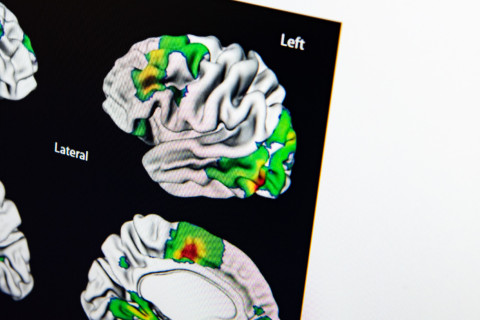Business Finland has granted Co-creation funding for the University of Eastern Finland and the e-FINGERS project. The aim of the Co-creation phase is to build a network of collaborations between academic partners and companies.
e-FINGERS aims to develop new and more sustainable approaches to identify people at risk for Alzheimer’s disease and dementia. Based on the FINGER study (Finnish Geriatric Intervention Study to Prevent Cognitive Impairment and Disability) this project aims, together with industry collaborators, to find novel approaches to promote brain health. The aim is to proceed to Co-Innovation funding, which would allow for an actual innovation project for 2-3 years. The project is coordinated by Neurocenter Finland, Associate Professor Alina Solomon of the University of Eastern Finland is the Principal Investigator and Annalaura Jokiniemi is the Project Coordinator.
The results of the FINGER study are impressive. It is the first randomised controlled trial to show that a multimodal lifestyle-based intervention can improve or maintain cognitive functioning among older people at risk for dementia (Ngandu et al 2015). So far, the only effective way to prevent cognitive decline is to follow a multimodal lifestyle intervention affecting several cognitive areas: overall cognition, memory functions, and processing speed.
Dementia and Alzheimer’s disease are major public health problems. After many failed clinical trials, there are still no effective, widely available disease-modifying drugs. Accurate identification of people at-risk or in early disease stages can increase the likelihood of developing effective disease-modifying therapies, but to do this we need to find new sustainable ways of working. This includes, for example, an updated FINGER 2.0 model, which is combining multimodal lifestyle-based interventions with potential disease-modifying drugs.
Alina Solomon’s pioneering scientific work is focusing on Alzheimer’s disease and dementia, with particular emphasis on prevention and early diagnosis. Solomon is involved in many different studies using the FINGER model, and she is the scientific coordinator for both FINGER study and the World-Wide FINGERS network (WW-FINGERS). WW-FINGERS is the first global network of multimodal dementia prevention trials, and it has currently 45 member countries. WW-FINGERS is established for testing, adapting, and optimizing the FINGER model in a variety of at-risk populations across multiple countries, cultures, and resource levels.
The e-FINGERS project, coordinated by Neurocenter Finland, is based on the impressive results from the FINGER model. Early detection of risk of disease and investment in the prevention of memory function decline play a significant role in maintaining cognitive abilities. e-FINGERS aims to develop the innovations needed for translating successful research into effective practical solutions. The target is the development of novel virtual tools to promote personalized brain health and dementia prevention. Such novel tools could be, for example, software or digital biomarkers for finding people at risk or in early disease stages. This would help directing them to the right trials and treatments, but also improve the monitoring of disease, risk and therapeutic effects over time. These tools would be designed to be adaptable to other brain conditions beyond Alzheimer’s disease and dementia in the future. Ultimately, e-FINGERS aims to become an internationally connected virtual facilitator for innovative neuroscience research & development activities, with early involvement of industry collaborators.
At the moment, the project is building a consortium interested in developing new innovations in order to transform productive research into effective practical solutions. The e-FINGERS project is currently looking for partners from Finnish companies. If your company has an interest in a joint project, please contact Alina Solomon ([email protected]) or Annalaura Jokiniemi ([email protected]).
More information:
Ngandu, Tiia, et al. “A 2 year multidomain intervention of diet, exercise, cognitive training, and vascular risk monitoring versus control to prevent cognitive decline in at-risk elderly people (FINGER): a randomised controlled trial.” The Lancet 385.9984 (2015): 2255-2263.



